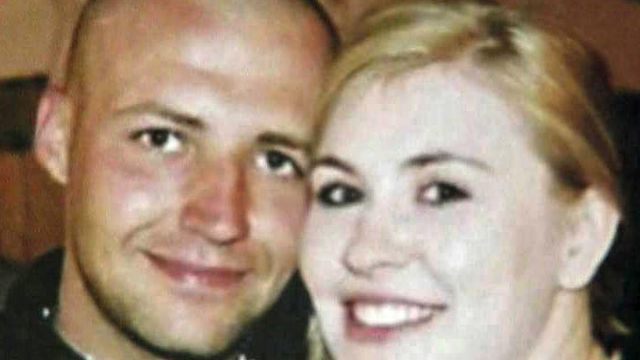Mom: Military needs to stop soldier suicides
U.S. troops committed suicide at a rate of roughly one a day in the first five months of this year, according to the Pentagon. Lillington resident Angie Selvia knows the sad statistics. She lost her daughter and soldier son-in-law on Feb. 4.
Posted — Updated“It was the worst thing I’ve ever had to deal with in my life,” she said.
The Pembertons’ tragedy is one snapshot in the bigger picture of violence and suicide among active-duty military members.
The Pentagon reported 154 suicides among active-duty military members this year from Jan. 1 through June 3, compared with 124 killed in Afghanistan during the same period. The death toll has exasperated military leaders from Washington to Fort Bragg.
Selvia says she saw no sinister signs and felt no bad vibes last Christmas – the last time she saw her daughter, Tiffany Pemberton, and son-in-law, Jason Pemberton, 28. A little more than a month later, Jason Pemberton shot and killed his 25-year-old wife and then turned the gun on himself, committing suicide.
“She was his world, and he was her world,” Selvia said. “I really did not (see any signs) … If he had been in his right mind, he never would have done that. Never.”
Medically discharged from the Army after three deployments to Iraq, Jason Pemberton received three Purple Hearts for his injuries. The former warrior came home, moved to Daytona Beach, Fla., with his wife and enrolled in a motorcycle repair school.
Despite the distance, Selvia and her daughter remained close.
“There was not a day that went by that we did not speak over the phone,” Selvia said, noting that they would often talk four or five times a day.
Selvia said she knew her son-in-law’s mind had become a battlefield, full of depression and post-traumatic stress. James and Tiffany Pemberton went to the Veterans Affairs hospital a couple of times shortly before he ended it all.
“They would tell her, or would tell him, that they couldn’t help him anymore. They didn’t know what else to do for him,” Selvia said. " (My daughter) knew that he struggled. She knew that he struggled every day, and she was right there with him, struggling and trying to help him.”
Earlier this summer, Defense Secretary Leon Panetta called suicides "the most frustrating challenge" he has faced as secretary. He says it's up to military members of all ranks to look for signs of stress among their comrades and aggressively urge them to seek help.
Maj. Gen. Michael Garrett, former chief of staff for the 18th Airborne at Fort Bragg, said earlier this year that officials have examined every suicide at Fort Bragg, and they have seen four common threads – relationship failures, professional failures, alcohol abuse and drug abuse. Those factors can be caused or worsened by multiple deployments, he said.
“We have just not come up with the answer that would help folks solve problems without killing themselves,” Garrett said. “I think that 10 years at war is the reason we’re having many of the challenges that we do,” Garrett said.
Something that makes the phenomenon so puzzling is that about half of the service members who committed suicide were never deployed. That has led some to reason that the tough economy, combined with the rigors of military life, is also to blame.
If they're not killing themselves, troubled troops sometimes commit high-profile acts of violence. In January, Staff Sgt. Joshua Eisenhauer fired a gun on firefighters and police officers from his Fayetteville apartment, sparking a four-hour standoff.
A former squad leader said Eisenhauer had been depressed after returning from his third deployment. He was assigned to the Warrior Transition Battalion, where soldiers recover from physical wounds and mental health problems.
Richard Varela is a licensed mental health counselor and Vietnam veteran whose Fayetteville clientele is mostly military. Whether a soldier has seen combat or not, he says, there is still a perceived stigma in asking for help.
“You’ve got great soldiers. They do a great job, but we’re taxing their coping skills to the max,” Varela said. “One of the problems with soldiers is that they’re afraid they’ll lose their jobs. They’re afraid they’ll lose their careers. They’re afraid they’ll lose their security clearances if it’s perceived they have a problem.”
Varela says many troops come back from combat feeling lost.
"One of the most dangerous times for anyone is when they lose their concept of self. In other words, where are they in space and time? When they can’t get that kind of connection, they float," he said.
"A small situation in your mind can become blown up to the point that you’re now hopeless and helpless, and maybe the last thing you’ve got control over is your own life," Varela added. "And then the familiarity with death, having seen so much of it in other countries, is like huh, just another day at work.”
Some soldiers see getting help as a weakness, but Garrett says that culture is changing.
“Soldiers today, family members today, have more outlets and are more comfortable talking about challenges and seeking help,” he said, noting the "ACE" approach, which stands for Ask, Care and Escort. "My sense is that we have reduced stigma. Soldiers are comfortable."
Still, Selvia says, the military needs to do more.
“They created this problem. Now they need to find a solution for it,” she said. " I would never want another family to deal with anything like this.”
• Credits
Copyright 2024 by Capitol Broadcasting Company. All rights reserved. This material may not be published, broadcast, rewritten or redistributed.






